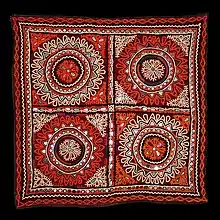Shisha (embroidery)
Shisheh or abhla bharat embroidery (Persian شيشه, abhala bharat; Hindi: आभला भरत, abhla bharat; Gujarati: આભલા ભરત), or mirror-work, is a type of embroidery which attaches small pieces of mirrors reflect metal to fabric. Mirror embroidery is spread throughout Asia, and today can be found in the traditional embroidery of the Indian subcontinent, Afghanistan, China, and Indonesia.
History

The Shisha embroidery was originated in the 17th century in India. Traditionally, shisheh or abhla bharat work was done using Mica but Beetle, Tin, Silver or Coins were not uncommon depending on the region. This was replaced by glass blown into large thin bubbles and broken into small pieces for this use. Traditional shisha mirrors have a convex curve due to this process. The tradition of making circular shisha was extensively done by women in South Asia, who use special scissors that are repeatedly dampened to prevent flying shards, and snip them into smaller circular shapes.
The use of decorative mirror or shisheh was introduced from Muslim lands during the Mughal Empire. However shisheh embroidery was not used on Mughal clothing but rather found only on traditional folk clothes of the Indian subcontinent and Central Asia. The term shisheh means glass in Persian, from where the word transferred to Urdu/Hindi and other related languages. Contemporary shisheh work almost entirely consists of mass-produced, machine-cut glass shisha with a silvered backing. Today most craft stores in the South Asia carry small mirrors purchasable for use in embroidery, which come in varying shapes and sizes.
This form of embroidery work is now most common on the Indian subcontinent, especially in parts of Gujarat, Rajasthan, Haryana, Delhi, Madhya Pradesh, Bihar, Karnataka, Andhra Pradesh, Manipur, Baluchistan, Punjab region[1] and Sindh. This type of embroidery lends a sparkling appearance to the brightly colored clothes worn in the region, and is very popular for use on clothing, hangings, tapestries, and domestic textiles.
Religious significance
Among Hindus in Rajasthan, Gujarat, Madhya Pradesh and Haryana the use of abla bharat torana or shisha torana tied to the front door is believed to ward off evil eyes. This belief is also held by Muslims and Jains living in those regions.
Images
%252C_Saurashtra%252C_Gujarat%252C_India%252C_20th_Century%252C_cotton%252C_metal_and_mirror_pieces._plain_weave_with_embroidery_and_mirror_work%252C_Honolulu_Academy_of_Arts.jpg.webp) Altar Torana from Gujarat, 20th Century, plain cotton weave with embroidery and mirror work, Honolulu Museum of Art.
Altar Torana from Gujarat, 20th Century, plain cotton weave with embroidery and mirror work, Honolulu Museum of Art.


